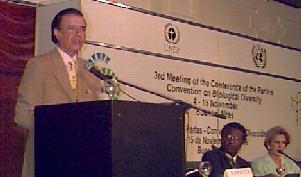 |
[Linkages Home]
[Send Feedback] [Up one level] |
Diego Malpede, Delegation of Argentina
Friday 15 November 1996
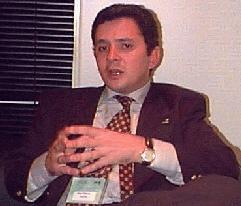
|
| Intellectual property rights: Malpede said COP-3's decision on intellectual property rights initiates a process of collaboration on the issue with the World Trade Organization and others. |
(Total Length: 14:17)
Carlos Saul Menem, President of Argentina
Wednesday 13 November 1996
In Spanish Only (Total Length: 11:17)
Aniceto B. Montellano, Centro Comunitario Finca Potrero
and Wenceslao Simón Villanueva, Consejo de Acontecimientos Aborigines
Friday 8 November 1996
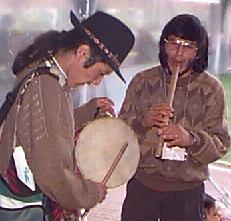
Bio-rythms: Taking a break between negotiations, NGO participants Montellano and Villanueva played music in the hall of the Centro Dorado. |
(Total Length: 0:57)
Violet Ford, Inuit Circumpolar Conference
Terry Williams, Tulalip Tribes
Fred Fortier, First Nations of British Columbia
Thursday 7 November 1996
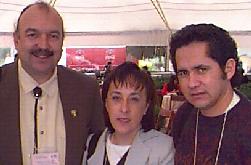
|
| Left to right: Williams, Ford and Fortier: management of biodiversity under the CBD can unite indigenous and local communties and support both ecological and cultural survival. |
Following a discussion in the COP of the issue, ![]() Ford, Williams and Fortier spoke Thursday with ENB editors Désirée McGraw and Steve Wise on the relationship between indigenous and local communties and biodiversity and about the Biodiversity Convention's article 8j, which requires that parties "respect, preserve and maintain knowledge, innovations and practices of indigenous and local communities" related to biodiversity.
Ford, Williams and Fortier spoke Thursday with ENB editors Désirée McGraw and Steve Wise on the relationship between indigenous and local communties and biodiversity and about the Biodiversity Convention's article 8j, which requires that parties "respect, preserve and maintain knowledge, innovations and practices of indigenous and local communities" related to biodiversity.
They reviewed proposals by indigenous groups during Thursday's debate, potential for indigenous peoples to unite efforts under the CBD, and the relationship of biodiversity to forest and fisheries management issues. They emphasized their desire for greater participation in the management of ecosystems, and the interdependence of ecological and cultural survival.
(Total Length: 9:57)
Edwin Barnes, Department of Environment, Science and Technology, Ghana
Wednesday 6 November 1996
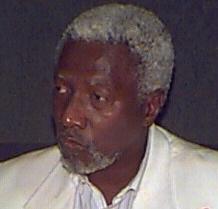
|
| Barnes: management of access to genetic resources that protects indigenous and local communities benefits the global community. |
(Total Length: 6:28)
Vandana Shiva
Tuesday 5 November 1996

|
| Shiva: agriculture must gain a "biodiversity consciousness." |
Shiva said that incorporating biodiversity conservation is at the heart of food security and sustainable development and that traditional agricultural practices provide important lessons for modern agriculture. She also discussed trade and intellectual property negotiations occurring outside the CBD, suggesting that these other negotiations need to develop a "biodiversity consciousness." Finally, she explained how farmers' rights and protection of indigenous and local knowledge can be promoted through the CBD and other international negotiations.
(Total Length: 7:41)
GEF Chief Executive Officer Mohamed El-Ashry
Monday 4 November 1996
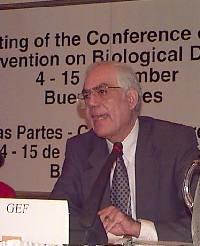
|
| El-Ashry: optimistic that eventual permanent designation as the Biodiversity Convention's financial mechanism is "an automatic thing" |
(Total Length: 6:42)
